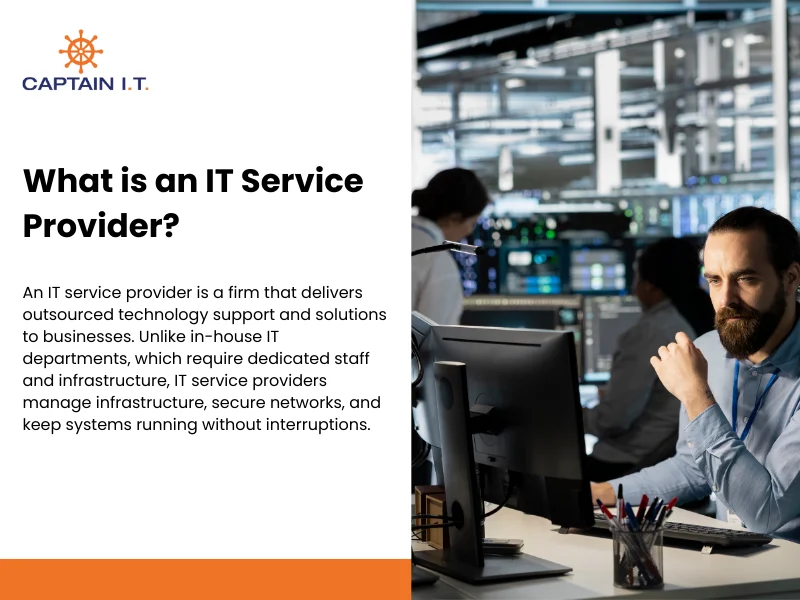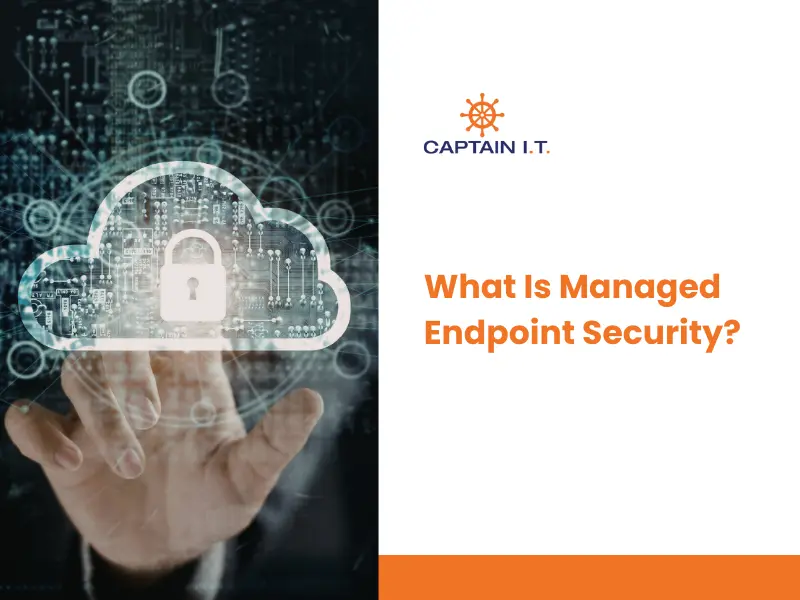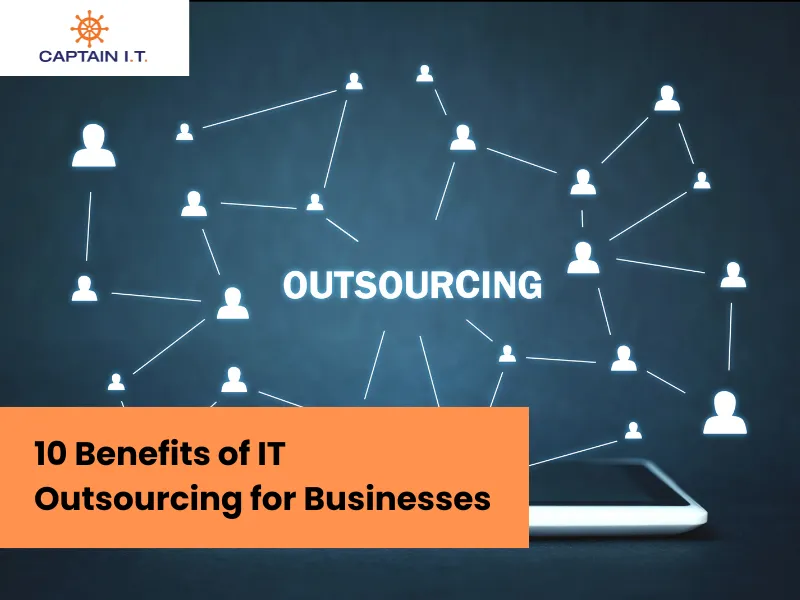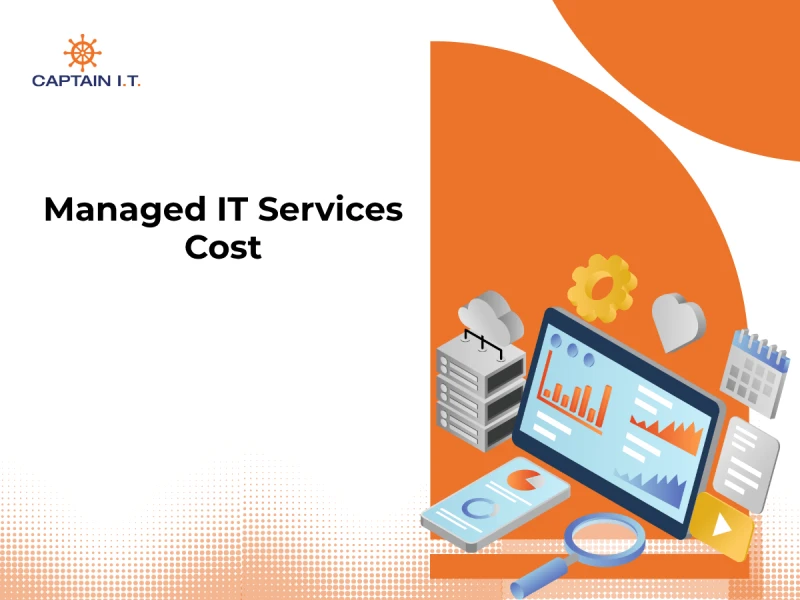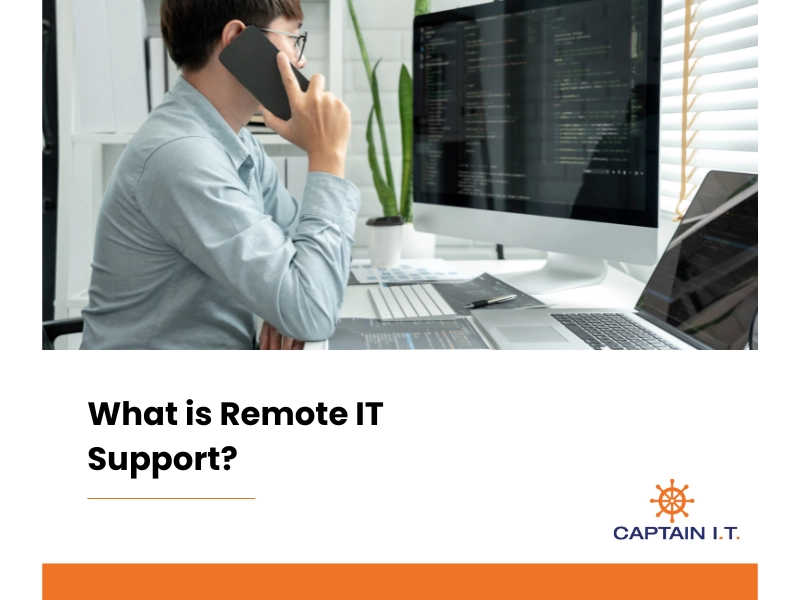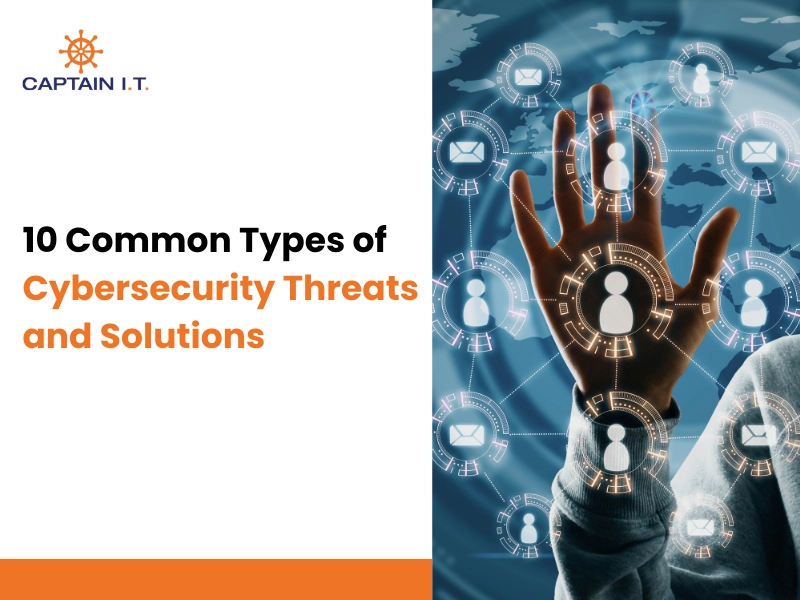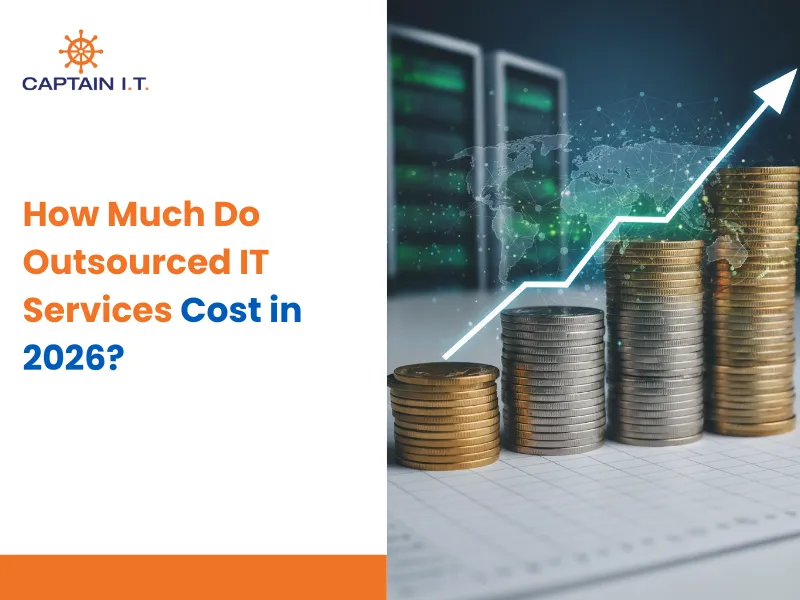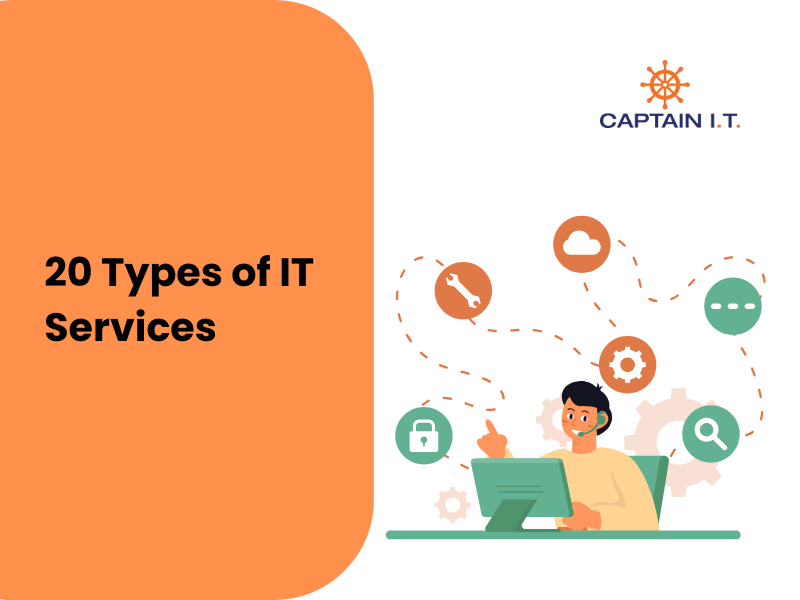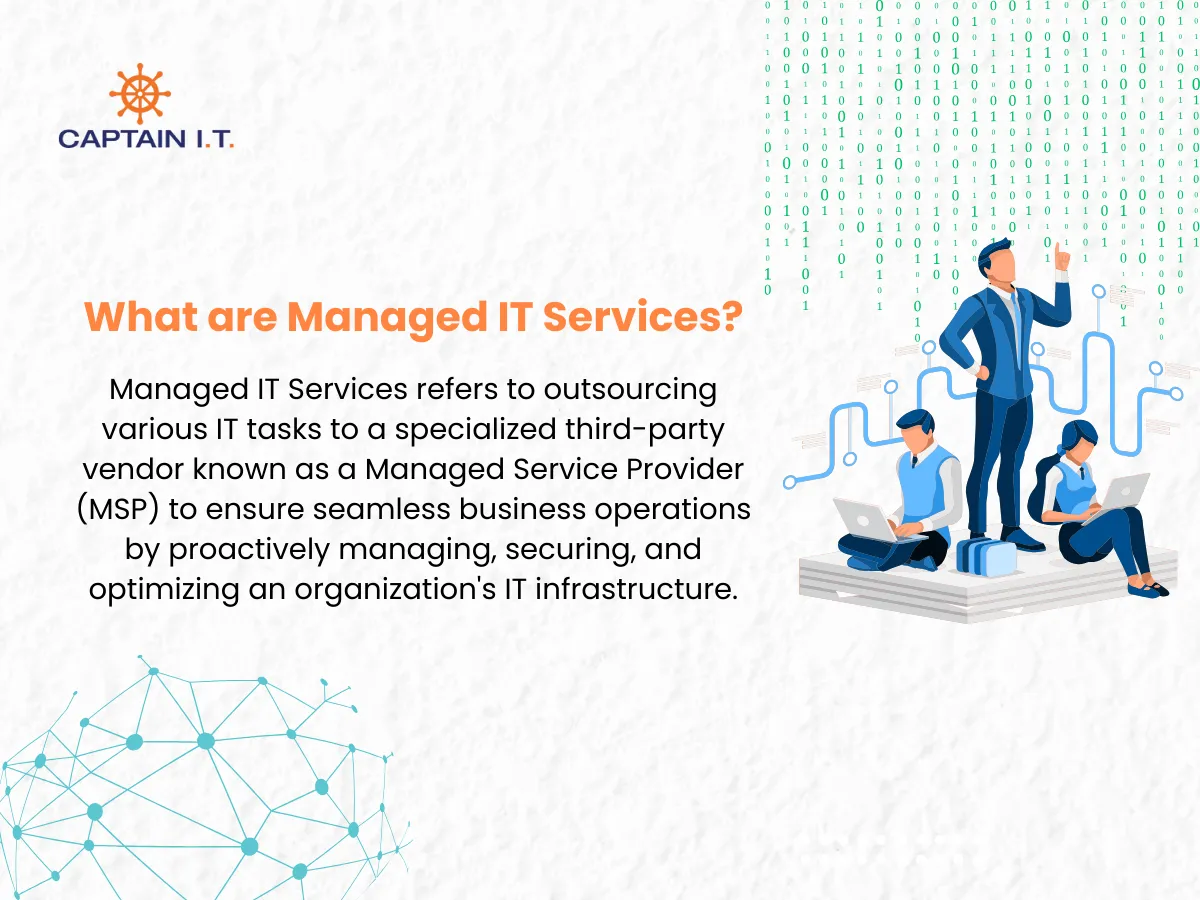An IT service provider is a firm that delivers outsourced technology support and solutions to businesses. Unlike in-house IT departments, which require dedicated staff and infrastructure, IT service providers manage infrastructure, secure networks, and keep systems running without interruptions.
These firms come in different forms, such as Managed Service Providers (MSPs), Cloud Service Providers (CSPs), Internet Service Providers (ISPs), Security-focused providers, and IT consulting firms. Some focus on day-to-day IT management, while others specialize in cloud platforms, internet connectivity, security, or strategic consulting. Together, they cover the full spectrum of business technology requirements.
The services offered typically include managed IT support, cloud computing, data backup and recovery, network monitoring, help desk management, and cybersecurity solutions. These services are designed to improve efficiency, reduce downtime, and keep IT systems aligned with business goals.
Businesses choose IT service providers to save costs, gain access to specialized expertise, strengthen their security, and scale IT resources as needed. Selecting the right provider requires evaluating service offerings, pricing, service level agreements (SLAs), and industry expertise to ensure the firm matches the company’s long-term needs.
Types of IT Service Providers
The main types of IT service providers are Managed Service Providers (MSPs), Cloud Service Providers (CSPs), Internet Service Providers (ISPs), Security Service Providers, and IT Consulting Firms. Each serves a different purpose, from daily IT support to cloud platforms, cybersecurity, connectivity, and long-term strategy. Choosing the right type depends on the specific needs and goals of the business.
Managed Service Providers (MSPs)
Many businesses rely on Managed Service Providers (MSPs) to handle the daily management of their IT infrastructure. Instead of handling everything internally, companies outsource IT management to improve efficiency and lower costs. MSPs typically deliver:
- Network monitoring
- IT support and troubleshooting
- Data backup and recovery
- Cybersecurity protection
With these services, MSPs reduce downtime, strengthen security, cut operational costs, and ensure technology supports business goals. For instance, well-known MSPs such as Captain IT give businesses access to expert IT services, allowing them to focus on growth instead of routine system management.
Cloud Service Providers (CSPs)
A Cloud Service Provider (CSP) is a firm that delivers IT resources over the internet, replacing the need for businesses to maintain physical servers or software in-house. This model makes technology more accessible and cost-efficient. Core services include:
- Infrastructure as a Service (IaaS): Virtual servers and storage resources
- Platform as a Service (PaaS): Development tools for creating applications
- Software as a Service (SaaS): Ready-to-use cloud applications like email or CRM
Well-known CSPs such as Amazon Web Services (AWS) and Microsoft Azure allow businesses to scale quickly, support remote teams, and innovate without heavy upfront investments. Their flexible models give companies of all sizes the ability to compete with enterprise-level technology.
Internet Service Providers (ISPs)
Every business relies on an Internet Service Provider (ISP) to stay connected to customers, partners, and cloud-based tools. ISPs are essential because reliable connectivity powers email, video conferencing, online transactions, and data sharing. ISPs typically provide:
- Broadband: High-speed connections suitable for routine operations
- Fiber: Ultra-fast, stable internet for large data transfers and heavy workloads
- Wireless: Flexible access for remote teams and mobile devices
By providing the backbone of digital operations, ISPs ensure smooth communication and productivity. Major providers like Verizon, AT&T, and Spectrum support millions of businesses worldwide.
Security Service Providers
Whether a company is small or enterprise-level, Security Service Providers are essential for protecting against cyberattacks that can halt operations and compromise sensitive data. These firms deliver targeted solutions to strengthen protection, including:
- Firewalls: Block unauthorized access to networks
- Threat detection: Spot and stop malicious activity in real time
- Vulnerability assessments: Identify and fix security gaps
- Encryption services: Protect sensitive information during transfer or storage
- Security audits: Evaluate compliance with industry regulations
In an era of rising cyber threats, security providers give businesses confidence to operate safely, comply with standards, and maintain customer trust. Leading firms such as Palo Alto Networks, Symantec, and Fortinet provide the expertise needed to stay resilient.
IT Consulting Firms
When businesses need expert guidance on technology decisions, they turn to IT consulting firms for strategic advice. Through IT consultations and specialized IT consultancy services, these firms help organizations plan, implement, and optimize their IT systems. Their core services include:
- Strategic IT planning: Aligning technology with business goals
- Technology integration: Ensuring smooth adoption of new tools
- Digital transformation: Modernizing operations with advanced solutions
By delivering tailored strategies and reducing costly mistakes, IT consulting firms provide measurable value. Global leaders such as Accenture, Deloitte, and Capgemini enable businesses to improve efficiency and remain competitive in fast-changing markets.
What Services Do IT Service Providers Offer?
IT service providers deliver a complete range of technology solutions, including Managed IT support, Cloud Services, Cybersecurity, Data Backup and Recovery, IT Consulting, Network Support, and Help Desk management. These services cover tasks like monitoring networks, securing systems, managing cloud apps, and restoring data. By handling both daily operations and long-term strategy, providers keep IT environments reliable, secure, and aligned with business needs.
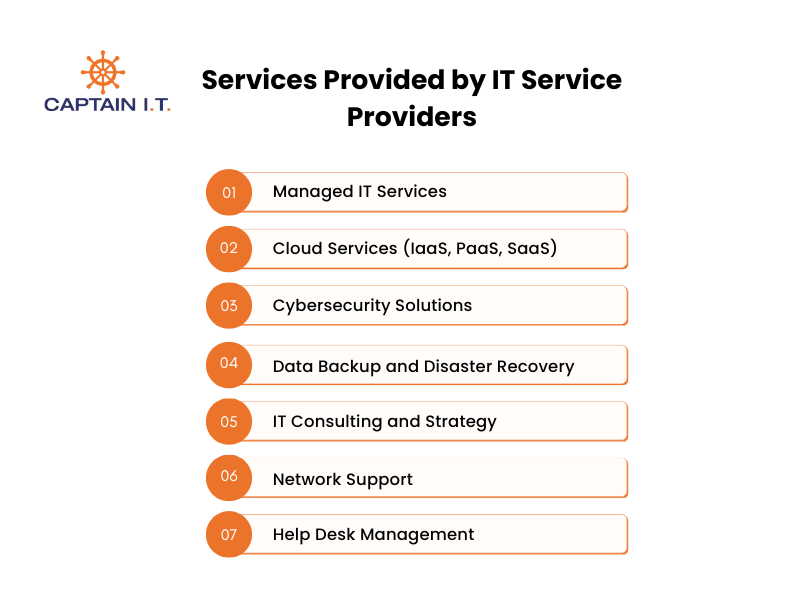
Managed IT Services
Through Managed IT Services, IT service providers take over the responsibility of maintaining and optimizing business technology so companies can stay productive and secure. These services include network monitoring to prevent disruptions, IT support for troubleshooting, software updates to keep systems current, and data backup to safeguard critical information. With proactive management and reliable support, providers reduce downtime and control costs by using automated monitoring tools, remote support platforms, and standardized maintenance processes that keep IT systems aligned with business priorities, freeing companies to focus on growth and customer success.
Cloud Services (IaaS, PaaS, SaaS)
Businesses rely on Cloud Services from IT service providers to access powerful computing resources and applications without maintaining costly on-site infrastructure. These solutions include Infrastructure as a Service (IaaS) for virtual servers and storage, Platform as a Service (PaaS) for building and deploying applications, and Software as a Service (SaaS) for ready-to-use tools. By offering scalable, flexible, and cost-effective options through data centers, virtualization technologies, and subscription models, providers help organizations improve collaboration, support remote work, and adopt new technologies that drive growth.
Cybersecurity Solutions
Protecting digital assets is critical for business continuity, customer trust, and regulatory compliance, which makes cybersecurity solutions indispensable. These services include threat detection to identify attacks in real time, firewalls to block unauthorized access, encryption to secure sensitive information, and security audits to evaluate system strength. IT service providers reduce risks and prevent breaches by deploying security information and event management (SIEM) tools, updating threat databases, and running regular vulnerability scans. Leading providers such as Palo Alto Networks, Symantec, and Fortinet deliver the expertise businesses need to stay resilient against evolving cyber threats.
Data Backup and Disaster Recovery
With reliable data backup and disaster recovery services, businesses can operate confidently knowing critical information is protected and recoverable. IT service providers use methods like cloud-based backups for secure online storage and off-site backups for protection against local failures. These solutions ensure files can be restored quickly, keeping downtime and losses to a minimum. Firms achieve this by automating scheduled backups, replicating data across multiple locations, and testing recovery procedures so businesses can continue operating after unexpected disruptions.
IT Consulting and Strategy
Guiding businesses through complex technology decisions is the focus of IT consulting and strategy services. Consulting firms provide expert advice on IT infrastructure and long-term planning, helping organizations align technology with business objectives. Their services often include evaluating current systems, recommending improvements, and supporting digital transformation initiatives. Its real value comes from consultants who analyze IT gaps, benchmark against industry standards, and design tailored roadmaps that help companies scale efficiently and remain competitive in changing markets. Leading IT consultation firms such as Accenture, Deloitte, and Capgemini deliver these services globally.
Network Support
Business operations depend on fast and stable connectivity, making network support services a cornerstone of IT management. These services cover troubleshooting to resolve technical issues, performance optimization to keep systems efficient, and regular maintenance of network components to prevent failures. IT service providers achieve this by using monitoring tools to detect bottlenecks, configuring network devices for optimal performance, and applying patches or firmware updates that prevent outages. Well-known providers such as Cisco, Juniper Networks, and regional MSPs deliver these solutions, ensuring businesses stay connected and operate without costly interruptions.
Help Desk Management
At the center of everyday IT support is Help Desk Management, which connects users to trained specialists who resolve technical problems quickly. These services typically include software troubleshooting for application issues, hardware repairs to restore devices, and general IT support for common workplace challenges. Providers keep help desks efficient by using ticketing systems, remote access tools, and tiered support teams that prioritize urgent issues and streamline resolutions. This approach reduces downtime, boosts productivity, and keeps operations running smoothly. ServiceNow, Zendesk, and regional MSPs deliver these solutions, giving businesses reliable assistance whenever technical issues arise.
Why You Should Consider IT Service Providers for Your Business?
Businesses should consider IT service providers to lower operational costs, gain expert knowledge, improve security, scale technology, and receive reliable support. By outsourcing technology needs, companies avoid heavy infrastructure expenses, access advanced tools, and benefit from 24/7 monitoring and assistance, keeping operations efficient while focusing on growth and core goals.
Cost Efficiency
Outsourcing IT helps businesses save money by eliminating the need for in-house teams and costly infrastructure while shifting expenses to service subscriptions, tool consolidation, and automation. Providers achieve this by offering shared expertise across multiple clients, using centralized monitoring platforms, and deploying cloud solutions that replace expensive on-premise hardware. This reduces overhead such as salaries, benefits, and training, and lowers capital expenditure for servers, data centers, and software licensing. The resulting savings can be reinvested into growth initiatives like marketing, product development, or customer service.
Access to Specialized Expertise
IT service providers give businesses access to specialized expertise in areas such as cybersecurity, cloud computing, and network management. Instead of hiring full-time experts, companies can tap into skilled professionals who bring deep, up-to-date knowledge. Providers achieve this through certified teams, partnerships with major vendors, and continuous training on new tools. This ensures businesses stay ahead of evolving technologies, from cloud migration to advanced security practices. By filling skill gaps and introducing cutting-edge solutions, providers help organizations innovate faster and compete more effectively.
Enhanced Security and Risk Management
Partnering with IT service providers strengthens security and risk management by protecting businesses against growing cyber threats. Providers implement firewalls to block unauthorized access, use encryption to secure sensitive data, and deploy threat detection systems that monitor attacks in real time. They also run audits and apply risk management frameworks to identify and fix vulnerabilities. These measures reduce the chance of breaches, safeguard business continuity, and give companies peace of mind knowing their systems and customer data remain protected.
Flexibility and Scalability
When technology needs change, flexibility and scalability in IT services let businesses expand or reduce resources without major upfront costs. Providers make this possible by using cloud platforms that allocate storage and computing power on demand, virtualization that optimizes existing hardware, and modular contracts that adapt services to business size. This setup allows companies to handle rapid growth, seasonal demand, or new projects efficiently. By removing infrastructure limits, IT providers help businesses stay agile, control expenses, and scale at the right pace.
Improved Focus on Core Business Functions
Outsourcing IT enables businesses to focus on core priorities like sales, marketing, and product development by shifting technical responsibilities to providers. Instead of employees troubleshooting outages or managing updates, IT service providers use remote monitoring tools to detect issues, automated patching to maintain systems, and dedicated help desks to resolve user problems. This prevents staff from being sidetracked by IT concerns and ensures technology runs smoothly in the background. With these distractions removed, businesses improve efficiency, accelerate growth initiatives, and direct resources toward strategic goals.
24/7 Support and Reliability
Uninterrupted operations depend on having 24/7 IT support and reliable system monitoring in place. Service providers deliver this assurance through continuous monitoring tools that detect issues immediately, help desk teams that troubleshoot problems at any time of day, and rapid incident response to restore services quickly. These measures reduce downtime, keep employees productive, and maintain business continuity. With providers like IBM, Rackspace, and regional MSPs offering round-the-clock coverage, businesses gain the confidence that their technology will remain dependable at all hours.
How to Choose the Right IT Service Provider for Your Business?
Choosing the right IT service provider requires evaluating their service offerings, pricing, expertise, service level agreements (SLAs), and customer support to ensure they meet your business needs. Key factors include:
- Services offered: Check if they provide managed IT, cloud, security, and support solutions you need
- Pricing model: Look for transparent, predictable costs without hidden fees
- Service Level Agreements (SLAs): Ensure clear guarantees on uptime, response times, and issue resolution
- Industry expertise: Choose a provider experienced in your sector’s challenges and compliance needs
- Customer support: Assess their availability, responsiveness, and quality of ongoing assistance
By weighing these factors, businesses can find an ideal IT service provider that not only manages technology effectively but also supports long-term goals. A well-matched IT partner reduces risk, improves efficiency, and ensures IT investments deliver measurable value.
